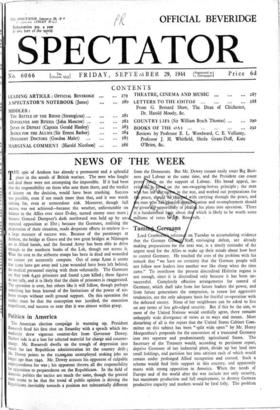NEWS OF THE WEEK
THE epic of Arnhem has already a permanent and a splendid place in the annals of British warfare. The men who fought and died there were not attempting the impossible. If it had been that the responsibility on those who sent them there, and the verdict of history on the decision, would have been crushing. Success was possible, even if not much more than that, and it was worth striving for, even at tremendous risk. Moreover, though full success was not achieved—because the weather, unfavourable on balance to the Allies ever since D-day, turned enemy once more ; because General Dempsey's dash northward was held up by un- expected opposition at Elst ; because the Germans, realising the desperation of their situation, made desperate efforts to retrieve it— a large measure of success was. Because of the paratroops at Arnhem, the bridge at Grave and the two great bridges at Nijmegen are in Allied hands, and the Second Army has been able to drive through to the southern banks of the Lek, though not across it. What the cost to the airborne troops has been in dead and wounded we cannot yet accurately compute. Out of some 8,000 it seems that 2,000 have got away and 1,200 wounded have been left behind, the medical personnel staying with them voluntarily. The Germans say they took 6,450 prisoners and found 1,200 killed ; these figures do not tally, and it is likely that the claim of prisoners is exaggerated. The operation is over, but others like it will follow, though perhaps something has been learned of the limitations of the power of air- borne troops without swift ground support. On this operation the verdict must be that the conception was justified, the execution magnificent, and success so near that it was almost within grasp.


























